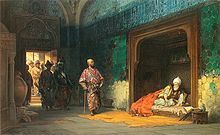Tamburlaine
play
Tamburlaine is a history by Christopher Marlowe, based on the life of Timur. It was written in 1587 or 1588.

Part 1
editPrologue
edit- From jigging veins of rhyming mother wits,
And such conceits as clownage keeps in pay,
We'll lead you to the stately tent of war,
Where you shall hear the Scythian Tamburlaine
Threatening the world with high astounding terms,
And scourging kingdoms with his conquering sword.
View but his picture in this tragic glass,
And then applaud his fortunes as you please.- Chorus, Prologue, lines 1–8
Act I
edit- Our swords shall play the orators for us.
- Techelles, scene ii, line 132
- Sooner shall the sun fall from his sphere
Than Tamburlaine be slain or overcome.- Tamburlaine, scene ii, lines 176–177
Act II
edit- Accurst be he that first invented war.
- Mycetes, scene iv, line 1
- Is it not brave to be a king, Techelles!
Usumcasanë and Theridamas,
Is it not passing brave to be a king?- Tamburlaine, scene v, lines 51–53
- Nature, that fram'd us of four elements
Warring within our breasts for regiment,
Doth teach us all to have aspiring minds:
Our souls, whose faculties can comprehend
The wondrous Architecture of the world,
And measure every wandering planet's course,
Still climbing after knowledge infinite,
And always moving as the restless Spheres,
Will us to wear ourselves, and never rest,
Until we reach the ripest fruit of all,
That perfect bliss and sole felicity,
The sweet fruition of an earthly crown.- Tamburlaine, scene vii, lines 18–29
Act IV
edit- Virtue is the fount whence honour springs.
- Tamburlaine, scene iv, line 132
Act V
edit- Virtue solely is the sum of glory
And fashions men with true nobility.- Tamburlaine, scene i, lines 189–190
Part 2
editPrologue
edit- His Second Part,
Where death cuts off the progress of his pomp
And murderous Fates throw all his triumphs down.- Chorus, lines 3–5
Act IV
edit- Well, bark, ye dogs; I'll bridle all your tongues.
- Tamburlaine, scene i, line 181
Act V
edit- ...In vain, I see, men worship Mahomet:
My sword hath sent millions of Turks to hell,
Slew all his priests, his kinsmen, and his friends,
And yet I live untouch'd by Mahomet.
There is a God, full of revenging wrath,
From whom the thunder and the lightning breaks,
Whose scourge I am, and him will I obey.- Tamburlaine, scene i, lines 177–183
- Come, let us march against the powers of heaven,
And set black streamers in the firmament,
To signify the slaughter of the gods.- Tamburlaine, scene iii, lines 48–50
- Tamburlaine, the Scourge of God, must die.
- Tamburlaine, scene iii, line 248
- Let Earth and Heaven his timeless death deplore,
For both their worths shall equal him no more.- Amyras, scene iii, lines 252–253
Quotes about Tamburlaine
edit- Do you know that the Barbican Center Theater of London has censored Tamburlaine the Great, the drama written in 1587 by Christopher Marlowe? At a certain point of the drama, remember, Christopher Marlowe makes Tamburlaine burn the Koran. While the Koran burns, he also makes him challenge the Prophet by shouting: «Now, if you have the power, come down and make a miracle!». And, given the fact that these words and the Koran burning infuriated local Muslims, the Barbican Theater has cut off the whole scene.
- Oriana Fallaci. The Force of Reason, 2006